|
|
|
Sort Order |
|
|
|
Items / Page
|
|
|
|
|
|
|
| Srl | Item |
| 1 |
ID:
127076
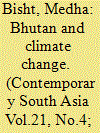

|
|
|
|
|
| Publication |
2013.
|
| Summary/Abstract |
The paper seeks to understand Bhutan's climate diplomacy and to identify the strategic implications of climate change for Bhutan. The implications are scaled at the national and the regional levels. The impact of climate change is studied within the broader analytical framework of the threats posed and the opportunities offered to Bhutan in the context of regional politics. The main argument is that India-Bhutan cooperation on climate change needs to be synchronized with the co-benefit approach, which India has been articulating at the national level. This approach, it is argued, will go a long way towards evolving a 'nuanced' approach in contemporary environmental diplomacy.
|
|
|
|
|
|
|
|
|
|
|
|
|
|
|
|
| 2 |
ID:
127074


|
|
|
|
|
| Publication |
2013.
|
| Summary/Abstract |
In Nepal, it is widely believed that in 1941 Yogmaya, a female religious ascetic, and 60 of her disciples drowned themselves in the Arun River. In many of her 'utterances' (bani), preserved in a book that was effectively banned in Nepal for 40 years, Yogmaya called upon the Rana government to establish a dharmarajya, a religious state. The mass suicide is now interpreted as an act of protest at the Ranas' failure to meet this demand. However, the event is not mentioned in any published history of Nepal. Yogmaya's revolt was 'rediscovered' by an American anthropologist in the 1980s and revealed to a group of activists in Kathmandu, who attempted to reinstate her in their country's political history. Twenty years later, Nepal's leading feminist journal launched a campaign to gain recognition for Yogmaya as Nepal's first woman rebel. A small-scale iconisation process has been underway ever since, with Yogmaya being constructed as, variously, a feminist leader, a progressive poet, an opponent of caste discrimination, and a political rebel. This article recounts the standard story of her life, evaluates recent constructions of her rebellion and attempts to explain the appeal of Yogmaya to progressive forces in modern Nepali society.
|
|
|
|
|
|
|
|
|
|
|
|
|
|
|
|
| 3 |
ID:
127082
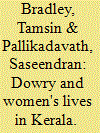

|
|
|
|
|
| Publication |
2013.
|
| Summary/Abstract |
This article presents new knowledge on the link between dowry and instances of abuse against newly married women. It draws on data collected during structured and in-depth interviews and focus groups involving 60 women in Kerala. The data argue that despite decades of campaigning by women's groups' dowry is still widely practised. Furthermore, the links between dowry, harassment and violence remain. The qualitative analysis of the data reveals how most people hold complex and seemingly contradictory views on dowry. Placing these views along a continuum with 'dowry is a problem' and 'dowry is necessary' at each end enables a picture to emerge of why dowry remains hard to eradicate. Most informants were clear that dowry represents a key problem for women; they also said they would continue to give dowry because it was the only way to secure a 'good' marriage. The data did reveal cracks in the patriarchal system; young women were direct identifying dowry as the main problem they faced. Also, indifferent views were voiced by younger men suggesting they may not forcefully act to maintain the system. Opportunities do exist to push wider holes in the system which could in turn spark the transformation still needed.
|
|
|
|
|
|
|
|
|
|
|
|
|
|
|
|
| 4 |
ID:
127081
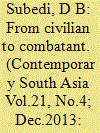

|
|
|
|
|
| Publication |
2013.
|
| Summary/Abstract |
Although combatants played a vital role in the People's War (PW) waged by the Maoists in Nepal, there is a dearth of knowledge about what motivated or compelled people to join the war, as well as what made the Maoists so successful in recruiting and mobilising committed insurgents. Engaging with these questions, this paper aims to understand the causes and drivers of combatant recruitment in the PW. The existing literature demonstrates that armed recruitment and participation in conflict is a phenomenon driven by structural and environmental factors in addition to other conditions, including class-based oppression as well as caste and ethnic grievances. This study, however, contends that in the Nepalese context, while such structural inequalities and disparities created favourable conditions for the PW to escalate, these factors alone cannot sufficiently explain: (a) how and in what ways the Maoists radicalised people or coerced them into becoming combatants and (b) what role the insurgent organisation and the state played in the recruitment dynamics. It argues that an understanding of armed recruitment and participation in the PW should also take into account certain mobilising factors, such as the Maoists' ideology and radicalisation campaigns. Furthermore, it situates the recruitment of combatants within the security paradigm and establishes that the insecurity and violence, caused by both the insurgent organisation and the state, explain voluntary as well as involuntary modes of armed recruitment in the PW.
|
|
|
|
|
|
|
|
|
|
|
|
|
|
|
|
| 5 |
ID:
127079
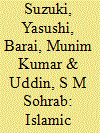

|
|
|
|
|
| Publication |
2013.
|
| Summary/Abstract |
With diverse histories and attitudes toward risk-taking, different financial systems have a common aim: ensuring financial stability and efficiency within a geographical region. But differences exist between various financial systems as a result of their evolution and adaptation to their surrounding environment. This paper aims to analyze the incentive and sanction mechanisms of the Islamic mode of banking and the Grameen Bank model of microcredit in Bangladesh, and how they help ensure their financial stability and efficiency. We challenge the conventional explanations of their success. We point out that the informal sanction mechanisms embedded in the two modes of financial intermediation - avoiding non-compliance with Islamic Shari'ah (revealed divine law) in the case of Islamic banking, and kinship-based groupings or gushtis in the case of microcredit - play important roles in lowering the transaction costs of screening and enforcing contracts. We also point out how bank rent opportunity - the promised return from non-participatory financing and a high spread supported through low-cost funds provided by donor agencies and compulsory savings - is captured in each of the two modes, playing a further important role in maintaining their franchise values, given the specificities of the Bangladeshi financial context.
|
|
|
|
|
|
|
|
|
|
|
|
|
|
|
|
| 6 |
ID:
127072
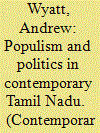

|
|
|
|
|
| Publication |
2013.
|
| Summary/Abstract |
Commentary on Indian politics frequently uses the term populism narrowly to refer to short-term, electorally driven expenditure. However, the term is more insightfully used when referring to an ideological construct that celebrates the importance of the people as an undivided group. Politics in Tamil Nadu has had a strongly populist character since the 1960s with both the Dravida Munnetra Kazhagam (DMK) and All-India Anna DMK (AIADMK) making appeals to the 'people' of the state. In the last decade, the DMK has adjusted its populist appeals to better connect with lower status groups, a constituency traditionally targeted by the AIADMK. The AIADMK re-worked its approach, using a technocratic populist discourse during its campaign to win the 2011 assembly elections, addressing concerns of higher status voters while still acknowledging its poorer supporters. Populist appeals have been adjusted to compensate for political weaknesses in the two governing parties. Economic and social changes since the late 1990s have created opportunities, as well as imperatives, for reworking populist appeals.
|
|
|
|
|
|
|
|
|
|
|
|
|
|
|
|
|
|
|
|
|